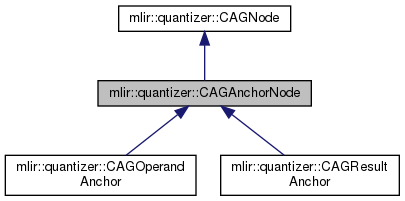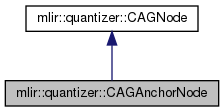#include <ConstraintAnalysisGraph.h>


Public Types | |
| enum | TypeTransformRule { TypeTransformRule::Direct, TypeTransformRule::DirectStorage, TypeTransformRule::ExpressedOnly } |
 Public Types inherited from mlir::quantizer::CAGNode Public Types inherited from mlir::quantizer::CAGNode | |
| enum | Kind { Kind::Anchor, Kind::OperandAnchor, Kind::ResultAnchor, Kind::LastAnchor = ResultAnchor, Kind::Constraint, Kind::SolveUniformConstraint, Kind::UniformPropagateExplicitScale, Kind::LastConstraint = UniformPropagateExplicitScale } |
| using | node_vector = SmallVector< CAGNode *, 1 > |
| using | iterator = node_vector::iterator |
| using | const_iterator = node_vector::const_iterator |
Public Member Functions | |
| CAGUniformMetadata & | getUniformMetadata () |
| Metadata for solving uniform quantization params. More... | |
| const CAGUniformMetadata & | getUniformMetadata () const |
| virtual Operation * | getOp () const =0 |
| virtual Value | getValue () const =0 |
| void | propagate (SolverContext &solverContext, const TargetConfiguration &config) override |
| void | printLabel (raw_ostream &os) const override |
| Prints the node label, suitable for one-line display. More... | |
| Type | getTransformedType () |
| TypeTransformRule | getTypeTransformRule () const |
| void | setTypeTransformRule (TypeTransformRule r) |
| Type | getOriginalType () const |
 Public Member Functions inherited from mlir::quantizer::CAGNode Public Member Functions inherited from mlir::quantizer::CAGNode | |
| virtual | ~CAGNode ()=default |
| Kind | getKind () const |
| int | getNodeId () const |
| Unique id of the node within the slice. More... | |
| bool | isDirty () const |
| Whether the node is dirty, requiring one or more calls to propagate(). More... | |
| void | markDirty () |
| void | clearDirty () |
| const_iterator | begin () const |
| Iterator over this node's children (outgoing) nodes. More... | |
| const_iterator | end () const |
| iterator | begin () |
| iterator | end () |
| const_iterator | incoming_begin () const |
| Iterator over this parents (incoming) nodes. More... | |
| const_iterator | incoming_end () const |
| iterator | incoming_begin () |
| iterator | incoming_end () |
| template<typename T > | |
| void | findChildrenOfKind (SmallVectorImpl< T *> &found) |
| void | replaceIncoming (CAGNode *otherNode) |
| void | addOutgoing (CAGNode *toNode) |
| bool | isOrphan () const |
| Whether this node is an orphan (has no incoming or outgoing connections). More... | |
Static Public Member Functions | |
| static bool | classof (const CAGNode *n) |
Protected Member Functions | |
| CAGAnchorNode (Kind kind, Type originalType) | |
 Protected Member Functions inherited from mlir::quantizer::CAGNode Protected Member Functions inherited from mlir::quantizer::CAGNode | |
| CAGNode (Kind kind) | |
Detailed Description
Anchor nodes represent points in the source IR where we may choose to introduce a type transition. These include operands, results, arguments returns, etc.
Member Enumeration Documentation
◆ TypeTransformRule
Constructor & Destructor Documentation
◆ CAGAnchorNode()
Member Function Documentation
◆ classof()
|
inlinestatic |
◆ getOp()
|
pure virtual |
Implemented in mlir::quantizer::CAGResultAnchor, and mlir::quantizer::CAGOperandAnchor.
◆ getOriginalType()
|
inline |
Gets the Type that was defined for this anchor at the time of construction.
◆ getTransformedType()
| Type CAGAnchorNode::getTransformedType | ( | ) |
Given the anchor metadata and resolved solutions, chooses the most salient and returns an appropriate type to represent it.
◆ getTypeTransformRule()
|
inline |
◆ getUniformMetadata() [1/2]
|
inline |
Metadata for solving uniform quantization params.
◆ getUniformMetadata() [2/2]
|
inline |
◆ getValue()
|
pure virtual |
Implemented in mlir::quantizer::CAGResultAnchor, and mlir::quantizer::CAGOperandAnchor.
◆ printLabel()
|
overridevirtual |
Prints the node label, suitable for one-line display.
Reimplemented from mlir::quantizer::CAGNode.
Reimplemented in mlir::quantizer::CAGResultAnchor, and mlir::quantizer::CAGOperandAnchor.
◆ propagate()
|
overridevirtual |
Reimplemented from mlir::quantizer::CAGNode.
◆ setTypeTransformRule()
|
inline |
The documentation for this class was generated from the following files:
- include/mlir/Quantizer/Support/ConstraintAnalysisGraph.h
- lib/Quantizer/Support/ConstraintAnalysisGraph.cpp
 1.8.13
1.8.13